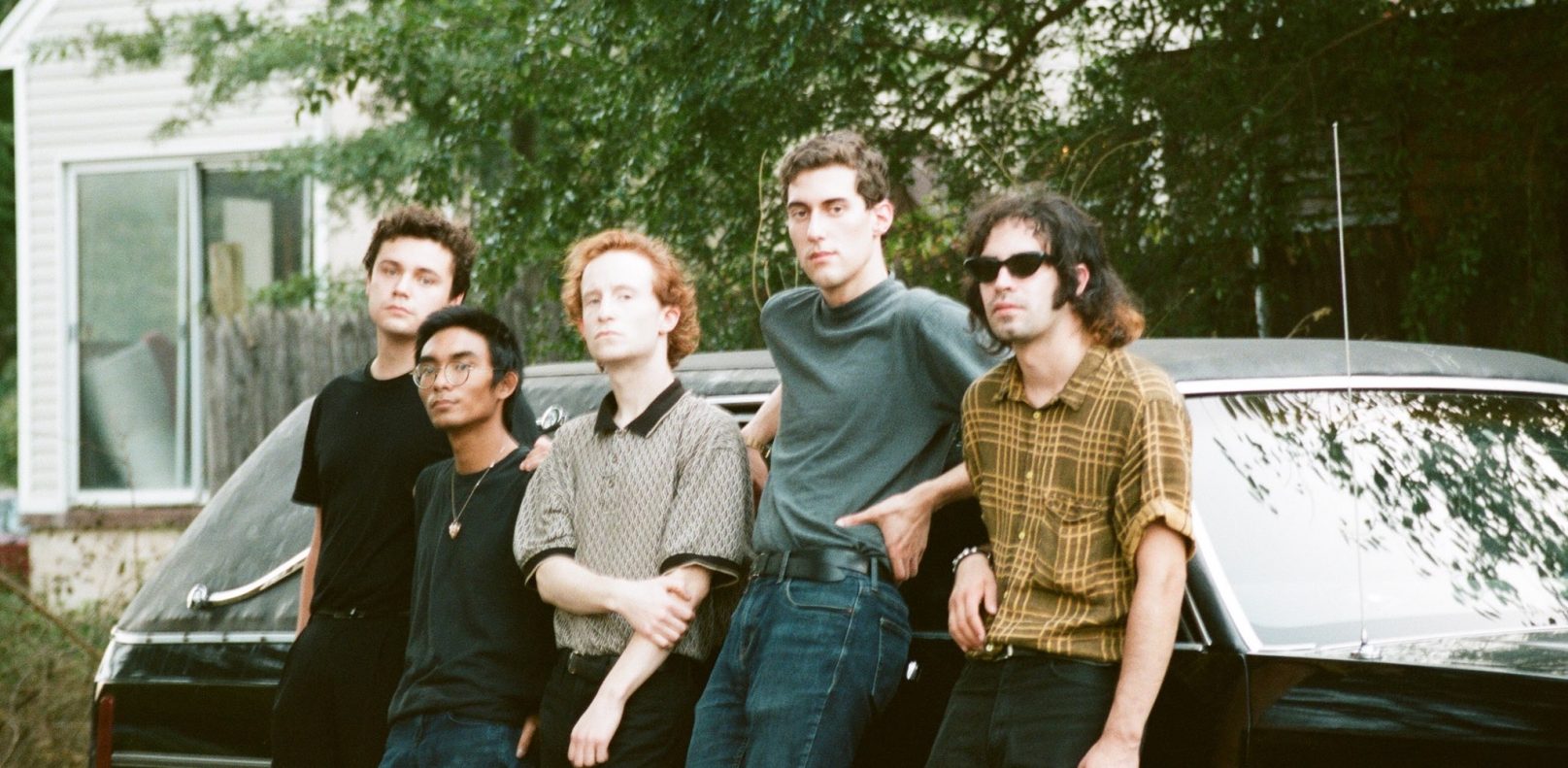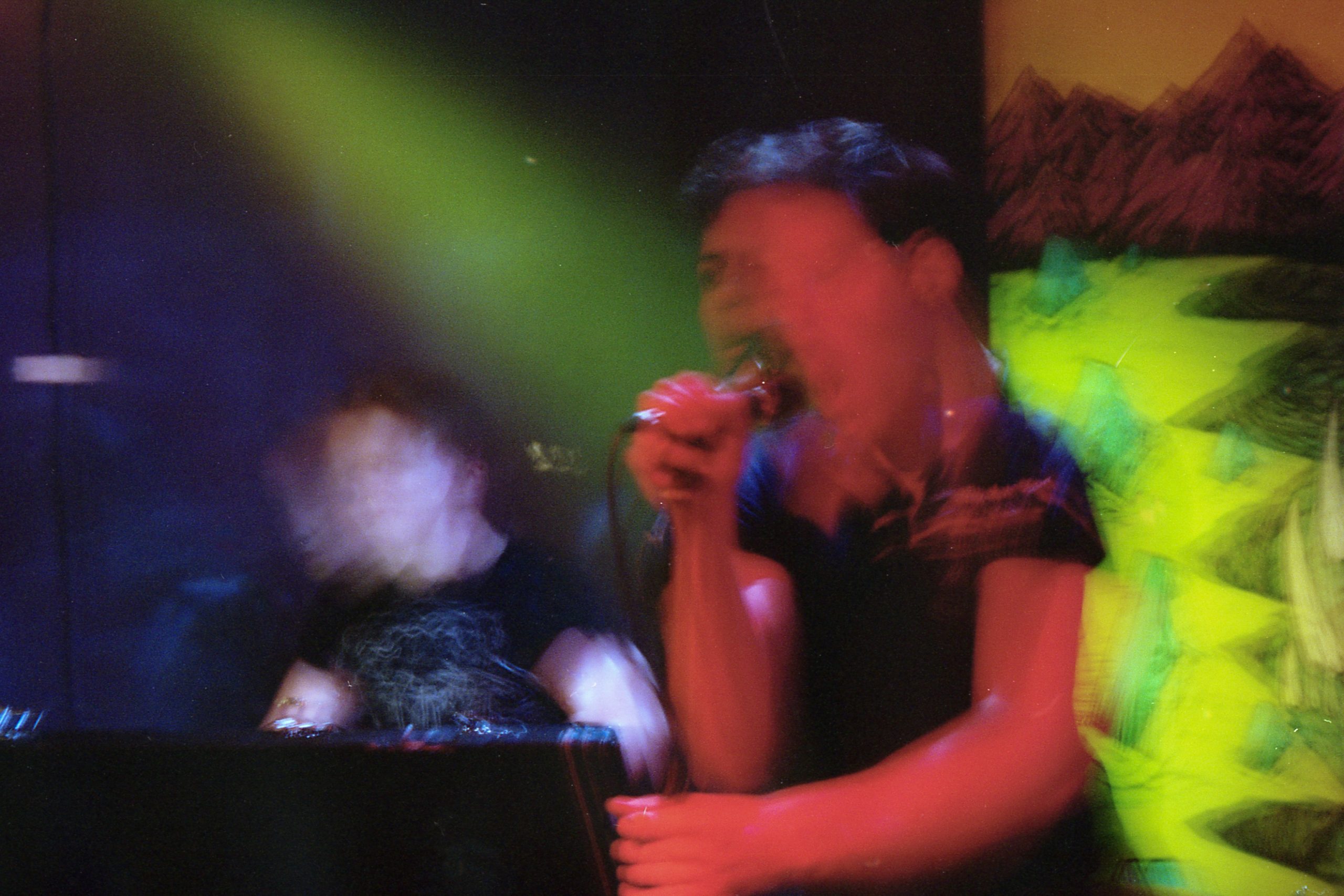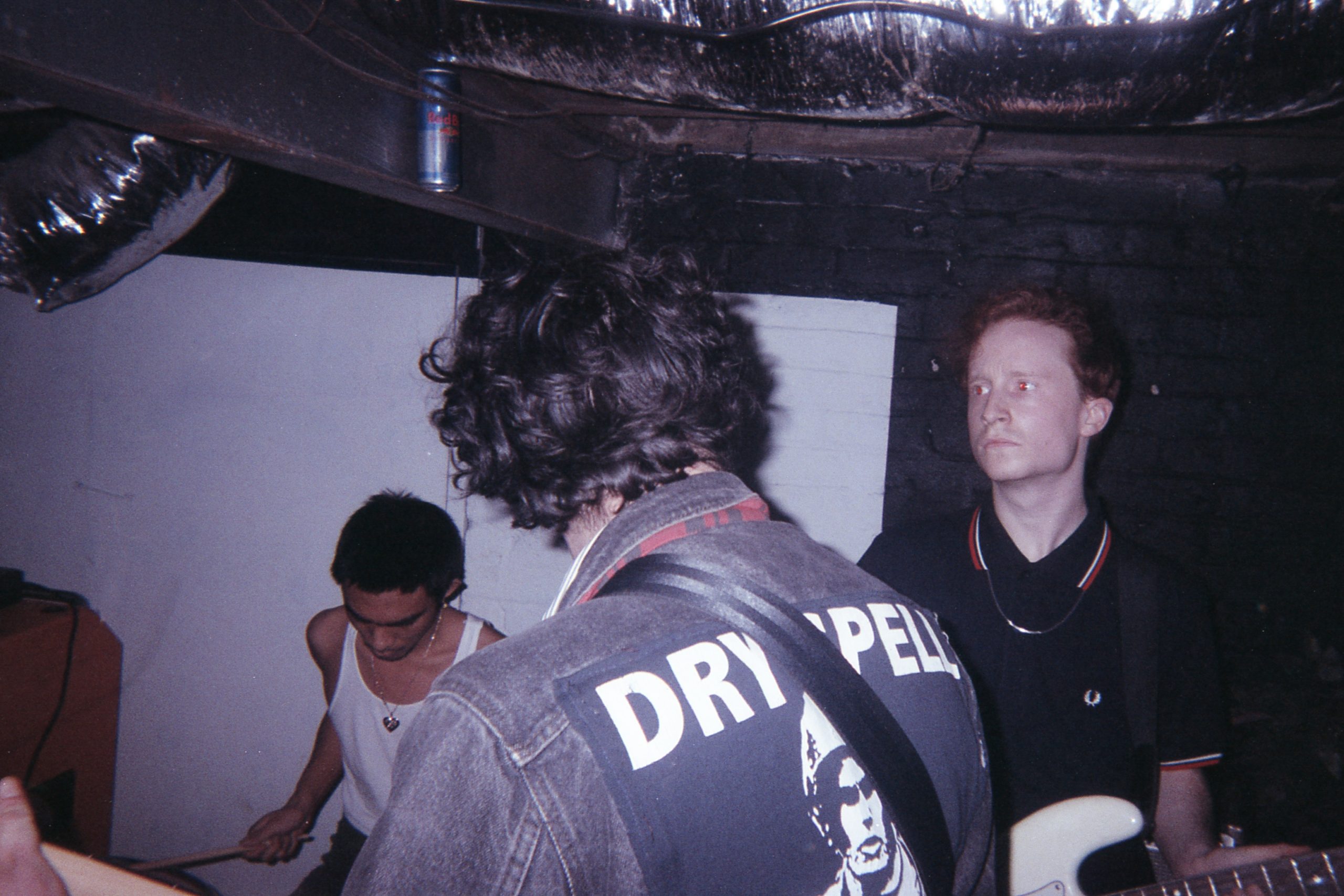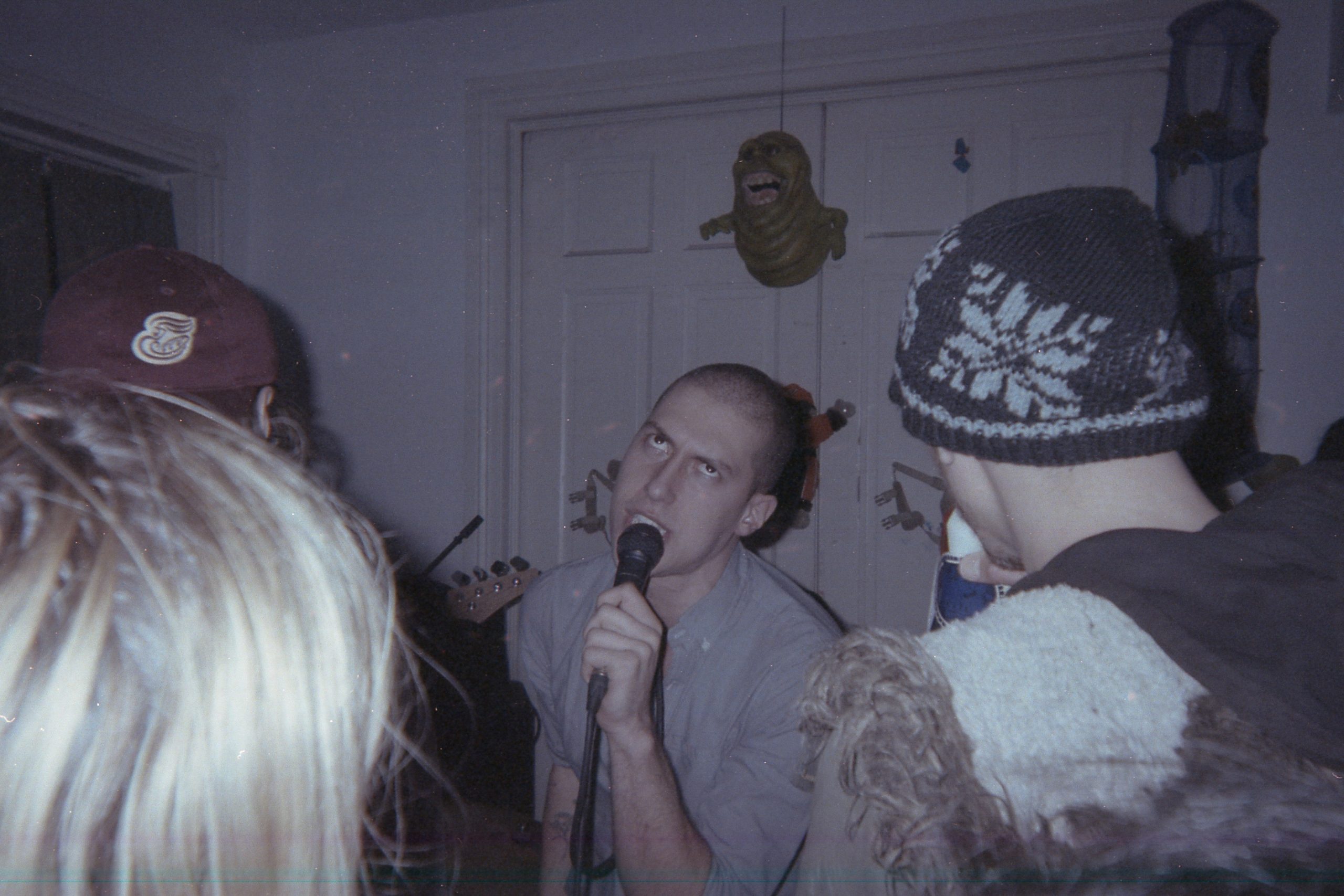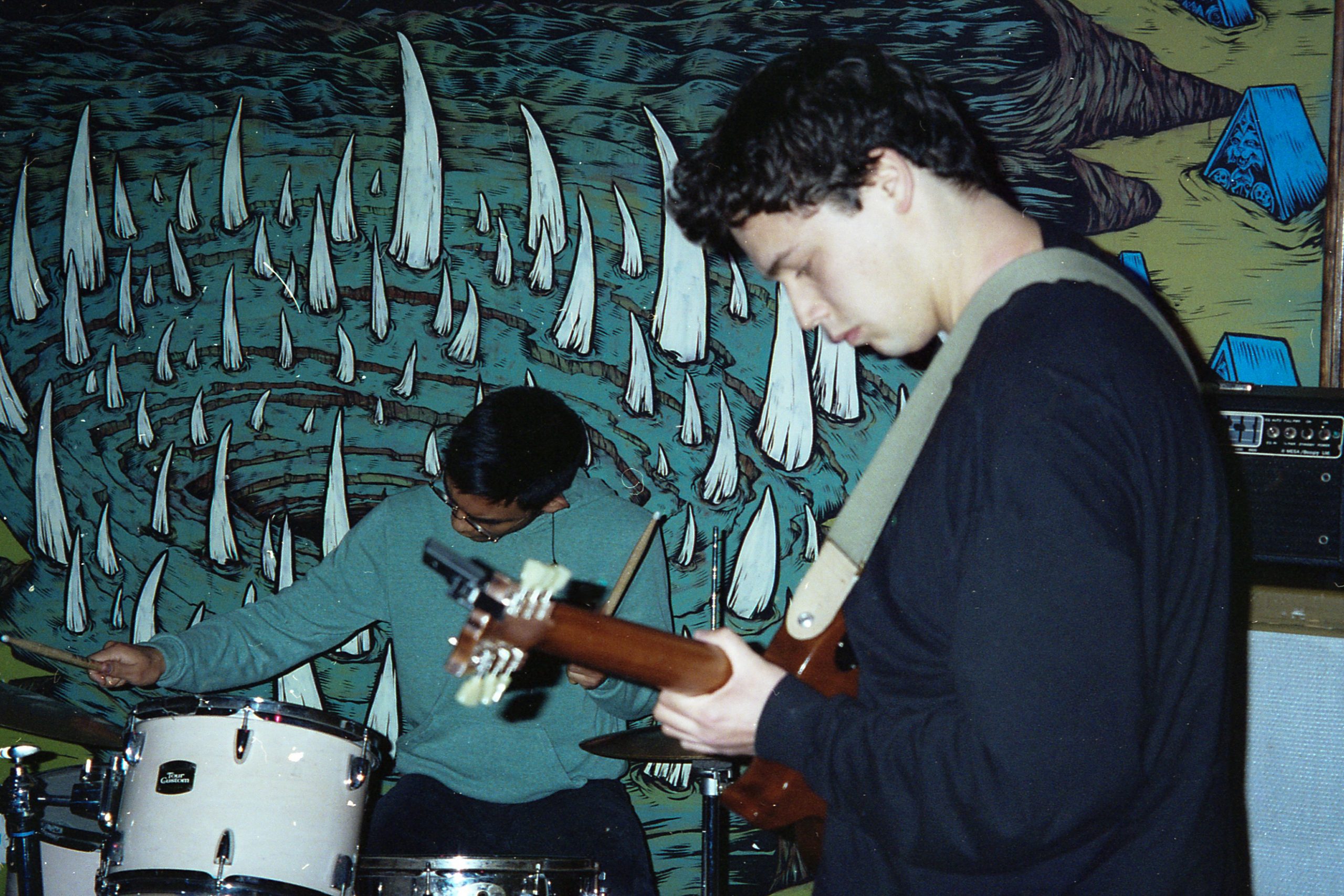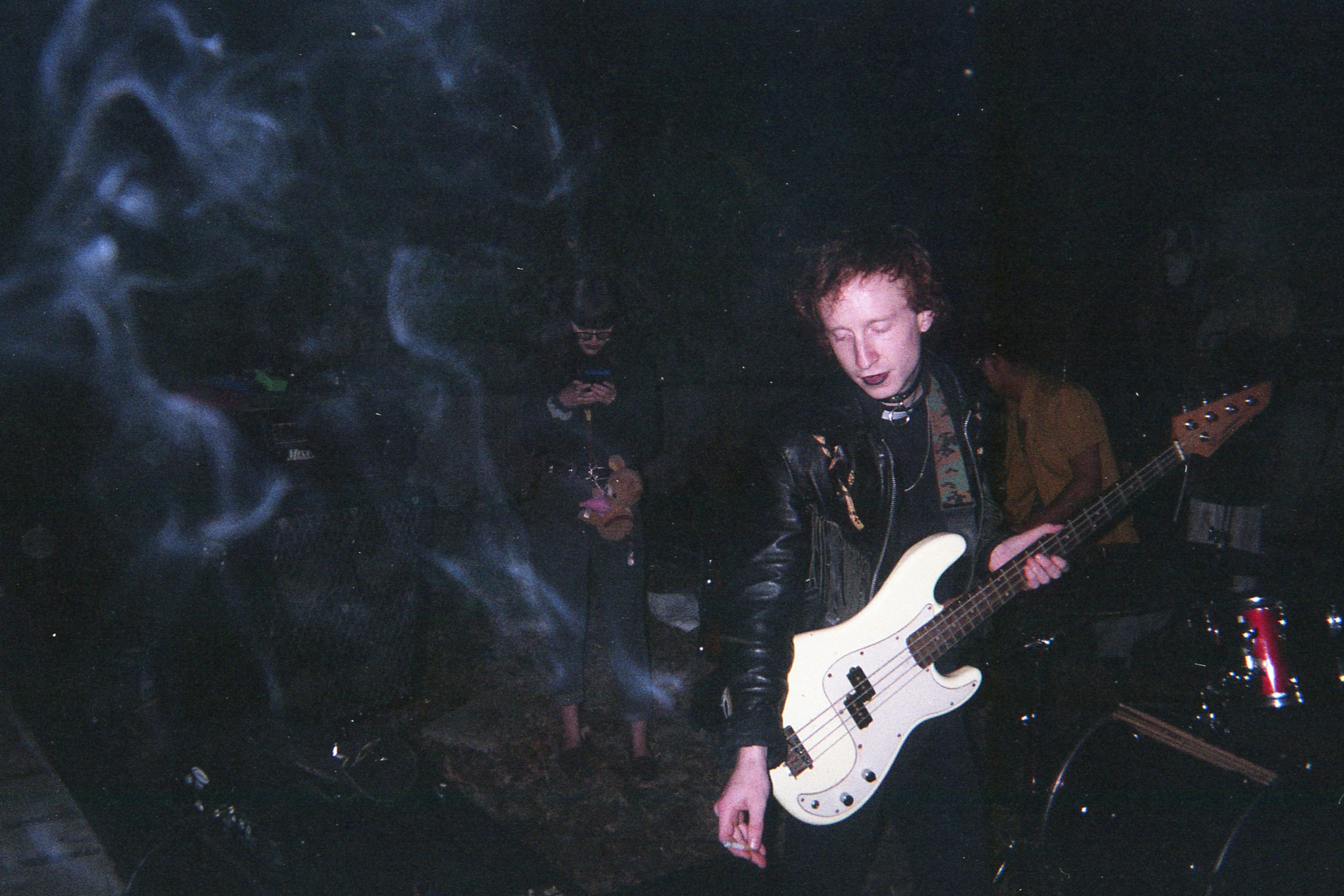Words and Interview by Piper Lynch
Photography by Travis Waddell and Kevin McCormick
Richmond’s True Body releases their latest single today, “Television”, a darkly ethereal pop song of longing that invites you to dance from their debut full-length album set to release this Spring, Heavenly Rhythms For The Uninitiated. Established in 2015 out of the local DIY scene, True Body found space in a collective of backgrounds and influence from the likes of “denizens of the hardcore and punk spheres, powerful trans thinkers and magicians, soldiers of techno and other various dance musik disciplines.” Ink recently sat down with Isabel Moreno-Riaño (Singer), Sam Ramos II (Drummer), Hector Castro (Rhythm Guitar), Camille Byrum (Bass/Synth), and Kevin Painter (Lead Guitar) to talk origins, sound, current and upcoming releases, and facets of importance to the band’s identity. Listen to True Body’s “Television” below and check out an interview with the band.
Listen to the Single:
[bandcamp width=100% height=120 album=4082541192 size=large bgcol=ffffff linkcol=333333 tracklist=false artwork=small track=2678432869]
The Full Album:
[bandcamp width=100% height=120 album=4082541192 size=large bgcol=ffffff linkcol=333333 tracklist=false artwork=small]
Can you start off by talking about your musical and creative backgrounds, and how the band came to be?
Isabel: We all grew up listening to music. I went to hardcore shows when I was in high school and that got me into DIY, and it made me feel like I could actually make music, so that was the beginning of a lot of it.
Hector: I’d say that’s really similar for me, too, just going to punk shows and hardcore shows. I was like, ‘Oh, I can do this too.’ Even though I don’t really play hardcore or punk as that strict genre anymore, it was like a trampoline.
Kevin: I was not the same. I was like a music nerd in middle and high school. I played in band. I played euphonium, and just listened to a lot of bad surf rock stuff. I didn’t really get to truly understand music until I met these fools. I just met them one day randomly at a “fucked-up show” and that changed everything, because before that I was literally just playing euphonium and listening to DIIV.
Sam: I learned how to play music through going to church, and my whole family was really deep into music. I was a voice major for a little bit, but that was a no-go. I guess the big thing out of all of it is that we all met through each other in a weird way, because I knew Kevin since I was in high school.
Kevin: Me and [Sam] would play music together and he’s the only one I knew before them.
Camille: I met Bel at a Surfer Blood show, and then I just saw [Isabel] around and we kept talking about David Lynch. Then we went to a Crystal Castles show, and that changed everything.
Isabel: Yeah. We’re basically just, like, all nerds.
Sam: We’re just nerds! [laughter]
Camille: Hardcore brought us all together, though. We all met at the “fucked up show,” and that’s where we decided to be a band.
Kevin: When we played our first show, Slump opened and then a lot of us, or at least I, met Hector for the first time. (Hector is also a member of Richmond psych-punk band, Slump)
You all mentioned hardcore’s importance to you, and though it’s not exactly the sound of the band, would you say there’s an aspect or sense of that community that you still relate to in True Body?
Camille: Absolutely. We talk about that all the time. Because DIY in Richmond is hardcore; those two things are linked together.
Hector: I mean, the ideas behind, even just the beginnings of synth-pop or post-punk, it all still stems from the ethos of punk and the hardcore movement of that generation in time; just deciding that they can create music because they can, and then booking your shows and booking your own tours and making your own merch.
Sam: I also think that one of the first places where we felt like we were accepted was in the hardcore and DIY spaces. Whether or not our music was divisive or whatever, I feel like we definitely had the most support through those channels.
Since the origins of the band, how would you say your sound has evolved with each other, up until ‘Heavenly Rhythms’?
Isabel: It’s definitely become much more of an expansive and vast thing. Initially, we would just push all the levels as high as they could go and it would all be really squashed, sound-wise. I think that we’ve worked a lot on giving things room and giving ourselves room to play over things or with elements in songs. It’s a lot more live when we play live and a lot more loud.
Kevin: I think also, from what you heard about us, we all come from such different backgrounds. And I think that’s really informed our sound recently. I think we really accept and encourage our different influences and where we come from to inform what we do now. So, that’s kind of changed with what we do. We’re all writing our own parts. It’s all where we come from, and I think that creates something different.
Isabel: The first few releases were either just me, or just me and Sam, or just me and Kevin, so this is the first time that it’s all of us now and that makes its mark.
Hector: I joined a year ago and True Body’s always been really good, so I was stoked to join. But these four alone, were still, sonically, really well put and clear with their goal to get across this synth-driven, rock ‘n’ roll that can be romantic or violent at different times.
Within your sound, you touched on a few themes, so I was wondering, overall, what are the themes that you’re drawn towards when making and writing music?
Isabel: A lot of it is, at least for myself, very personal. And, so, it comes from shit that can be hard to talk about sometimes, like growing up religious, and figuring out that you don’t belong in those environments. I’d say, thematically, the consistencies within our sound or our lyrics, etc. are religious guilt, romanticism. A lot of it acts as kind of a weird journal or communique, because I feel like a lot of the time talking to myself or to other people doesn’t really work. So, a lot of the themes, even in the consistent ones, are kind of off-the-cuff and improvised in a lot of ways.
Kevin: I think, especially with the new album, all of us have different meanings attached to it. For me, I wasn’t tied to the lyrics necessarily, so it doesn’t mean the same for me in the literal sense of what the lyrics are talking about, but I think it is the culmination of these past five years. When I listen to the songs, different songs callback to different times and feelings that I’ve had with these people, going through life and all the things we’ve done, and so it’s a huge emotional weight in that regard, because it really does feel like this one thing that represents five years of dumb shit that we’ve done and beautiful things that we’ve done and times where we all felt like it was for nothing. There’s really low points and all the high points. It’s all of that packaged into one album of our lives spent with each other so tightly and so deeply, which is why it’s very important to me and I think to all of us.
Isabel: I think a lot of what the album ended up being is really extreme, vague emotions, too, that can call to different things for different people. It can be whatever it’s supposed to be.
More specifically, can you talk about your newest single, “Television” that is coming out?
Isabel: That song was one of the earliest songs we’ve ever written. I wrote it in my friend’s dorm room when I was in college. It was a really shitty demo. It’s existed for seven or eight years, and it almost never saw the light of day, but then Hector sent us a video of him singing that song before he was in the band.
Camille: And I was like, “Yo, we gotta play this song now.”
Sam: Yeah, I was like, “What song is this? I’ve never heard this song.” [laughter]
Kevin: That happens so much.
Isabel: With “Television,” I’ve had a lot of problems with that song, because it’s so old and because I feel strange about my youth, but when it comes down to it, it’s just a pop song. It doesn’t necessarily even mean anything. It’s like random vignettes and slices of feelings to try and come up with something that isn’t consistent but can pull things from the audience.
Hector: It’s a good pop song. If you were detached from writing it, you might get something like an obsession out of it.
Isabel: It’s like that Lady Gaga song, “Bad Romance”.
Kevin: I think it’s a perfect example of one of those songs we’re talking about where it’s relatively vague in direct meaning, but I think that it also is … — ”vague” isn’t the right word, though.
Isabel: It’s supposed to be the echo of the experience, not the experience itself. So, it’s not necessarily vague, it’s a lot of things that can call to multiple things. All of it comes from the feeling of listening to other music that is really important to you. So that’s why it’s all just kind of in the ether. It’s indefinable because those are the things that are frustrating, the things that are compelling.
You joined Funeral Party Records this past summer. How did that become a good fit for the band, and how has your experience been with the label?
Sam: It feels really good to have a label that really feels like they’re making you a priority. We’ve talked to labels before and nine times out of ten—not that it has been 10 times now that we’ve been approved by labels but—it’s mostly that they put a lot of emphasis on one specific artist that they’re really focusing in on, and with Funeral Party it feels like we’re actually apart of something that they’re putting as much effort into everything, and it’s equal.
Kevin: Yeah, Brian, the person who runs Funeral Party, he never made us sign a contract. It never felt transactional in any way. It just felt like someone who genuinely cared about us as people and the music, and just wants to do whatever he can to push it forward, and that’s been amazing. [Brian] came down here from Louisville to meet us originally, and it just has always felt like a family thing, more so than anything to do with music industry b-s.
Camille: There are a lot of people out there who don’t really care, don’t want to help you and want to take advantage of you. We have met the lion’s share of those people, and Brian is one of the first people we’ve met who is not like that.
Following up, is there a kind of community or space that you hope to create for listeners and supporters?
Isabel: Yeah, 100%.
Kevin: Just an inclusive one where literally everyone can come and feel accepted and welcomed and like we want them to be there because we do.
Isabel: And dance.
Kevin: We’ve been through so many experiences where we’ve come from places where the music that we listen to is surrounded by communities that don’t feel like that, and it’s really frustrating to go to shows or to be in spaces where it just doesn’t feel welcoming and you feel like you have to prove yourself or something. So, I think the biggest thing is we want to, no matter what the situation is, create a community where it just doesn’t matter who you are or where you come from. We all share this one experience of enjoying whatever, and we just want to encourage that.
Hector: I think, in theory, because we liked hardcore and the ethos of an inclusive space for everyone but then weren’t experiencing that throughout the years, it shaped our sound and our desire to be a band that is inclusive to everyone and not egotistical, machismo stuff that you can find a lot of inside of that scene. True Body is a reflection of some of the experiences we’ve dealt with growing up in scenes that don’t practice what they preach. We just are trying to be really friendly people and encourage people just to feel themselves in the live setting when they’re watching us, but also enough to where they can maybe go make their own music, too.
Isabel: I feel like a lot of what is unifying between all five of us is the fact that we all have felt ostracized before. This is like a response.
Are there goals you would like to share, going into this year with the new album, either personally or as a unit?
Camille: There’s a lot of goals we have: there’s realistic ones and then there’s like dreams. Probably the simple answer to this question would be we’re trying to tour as much as possible and get better at it, so we can tour because it’s the only way we’re gonna get this music out there. Experiencing other cities and other people’s lives, every time we go on tour or anytime anybody goes on tour, you come back with a million stories. And that is my goal, or at least I think some of our goals, is to be able to experience the world.
Sam: I think the end goal is just to reach people, or what else is there?
Isabel: I think in terms of the goals for the unit, a lot of it does have to do with reaching people. But I think that truly something else that has been overlooked is the fact that we all just fucking love music, and that’s why we’re all doing this to a very large degree. At least, me personally, everything about my life is surrounded by this, and it’s how we see the world. And then, the traveling also comes into play, because, you know, we want to see what’s good.
Hector: I think a good goal in my mind, on top of the band being a vessel for the experience of touring, is that, ultimately, we could tour all we want, but if we’re not getting a message across, then that is for nothing. So, I think for me, that is the ultimate goal to set in stone for us as a band and to the listeners, so we come across [to others] as, “I saw this band, they made me feel good about myself and included and validated because I like their music.”
Camille: Yeah, there’s different types of goals that we have. We want to be the band that we would want to listen to, and help other people enjoy our music in the same way we’ve enjoyed bands that have affected us in the most benevolent, most pastoral way and not like a commercial way.
Isabel: I think that speaks to an underlying goal as well, which is much more of a lofty or theoretical goal, even though it is very dear and very practical, which is, at least for myself, there are multiple structures that have been built around us, either physically or conceptually that I think are poisonous, and that we target very intentionally or accurately. So, I think, it’s all of those things. It’s inclusion for the people that need it, freedom and validation for the people that need it, and also extreme and volatile attack against the people that deserve it and things that need to be destroyed.
Is there a favorite or recent work of art, in any medium or capacity, that’s had an impact on you or shaped you in some way?
Isabel: For me, it’s gonna be Songs of Leonard Cohen. The first record. That shit is real in a way that you cannot experience the feeling any other way other than listening to that record. I don’t know how to explain it. Once again, it’s one of the things that I think has compelled me to make music because it’s so inexplicable.
Hector: I would say “Venus in Furs” by The Velvet Underground. That song makes me stoked every time I listen to it. But then I get to play music that’s not even remotely close to that song, but it still gives me that same feeling sometimes. The Velvet Underground, for me, is a huge influence as far as an alternative outside thing.
Sam: Seeing New Order. That was, I don’t know, like an apex of my life. It felt very surreal, watching them play. Seeing them play Joy Division songs and the fact that they somehow could make something last forever, even after death, after a tragedy, is incredible.
Kevin: The Safdie brothers have been really inspiring to me recently. It’s mostly just because I’m very neurotic about stuff, and they made me realize the idea of things coming quickly and things happening fast has become really romanticized, and I’ve always felt really guilty about that. But I think they showed me that it’s good to be neurotic and it can end up creating beautiful things. Them talking about taking 10 years to write scripts and things like that, I’ve been finding a lot of inspiration in that recently.
Camille: Wings of Desire by Wim Wenders. The film goes around the city of Berlin in 1989, and you can just hear everybody’s thoughts and it’s quiet and that’s it. And I think this album and our music reminds me a lot of that movie. It’s shaped the way that I’ve experienced our music at first as a listener, and second as somebody who now plays in the band, in that it’s seeing the world from a lot of different people’s points of view and feeling validated, understanding that everybody feels anxious and alienated in a lot of different ways. The whole movie is very in-and-out of time and plays with your sense of time chronology. There’s this weird spatial element to the validity that we try to bring people, and I think that movie represents it really well.
To wrap up, are there any last thoughts or things that you want readers to know?
Isabel: As much as it doesn’t come off this way, I feel like our project is very political and practical in a lot of ways. That feeling of inclusion, the feeling we hope to give to our audience that we care for, doesn’t come without making it a priority of being very against certain things.
Sam: Just be yourself and don’t be a jerk. Don’t be mean. Love everybody but also don’t let other people tell you what to do.
